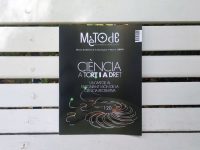«A lab of one’s own», by Rita Colwell and Sharon B. McGrayne
Cholera, sexism, and a woman's gaze in science
Gender inequality in the academic world is a widely studied phenomenon: salary gaps, glass ceiling, stereotypes regarding the technical and social skills of women scientists, the stigma of sexualisation in the professional sphere… Fortunately, the last few decades have seen slow but unrelenting change towards the eradication of sexism in scientific institutions. In addition to being an eminent microbiologist, Rita Colwell has been instrumental in this struggle. Thanks to her and others like her, women in science and the allies who support this movement today have more resources and strength than ever to advance the cause.

A lab of one’s own: One woman’s personal journey through sexism in science. Rita Colwell & Sharon B. McGrayne. Simon & Schuster. New York, 2020. 288 pages.
The title of the book is a declaration of intent. A lab of one’s own paraphrases Virginia Woolf’s iconic text, A room of one’s own. She used this image to argue that women writers need independence to contribute to the literary world, and, at the same time, that the literary world needs to set up a space for women writers. This is the premise of Rita Colwell’s work: women scientists need to feel structurally welcome in order to succeed in science, and science needs to welcome women scientists.
The book includes numerous stories illustrating the evolution of the struggle against gender discrimination in the United States. Many of them are, necessarily, heartbreaking: the lack of support from family and faculty towards her and her classmates («Girls don’t do chemistry», she was told by a chemistry professor when she asked for a letter of recommendation for university); university professors who failed to see her talent, as well as that of many other female students; systematic personal and institutional discrimination against female researchers at several universities; and, of course, appalling cases of sexual harassment and assault.
Notwithstanding the above, this is an inspiring and rewarding piece of reading, with the focus remaining on overcoming these obstacles. For example, it exposes the pioneering study by Alice Huang and her colleagues in the early 1970s, which established that women researchers in microbiology progressed more slowly and received lower pay at each step of their careers. It also covers Nancy Hopkins’ odyssey in the 1990s, which began by calculating the space of laboratories run by men and women at the Massachusetts Institute of Technology (MIT), and eventually helped to identify discrimination caused by unconscious bias at this institution and many others. These episodes are true socio-political thrillers, which fortunately end on a good note.
But, above all, this is an autobiographical book. Rita Colwell recounts her contributions to the study of the cholera pathogen, Vibrio cholerae. More specifically, her laboratory discovered that both V. cholerae and other close relatives could be found happily associated with copepods in various parts of the world, such as Chesapeake Bay and the Bay of Bengal. This overturned the dogma that this bacterium was strictly a human parasite, and thus introduced environmental ecology as a necessary discipline in the study of vibrio biology and strategies for suppressing new epidemics.
Rita Colwell is also known as a tireless founder of scientific institutions. In the 1980s, as the president of the American Society for Microbiology, she championed and addressed policies favouring gender and racial diversity. Most memorably, Colwell was the first female director of the US National Science Foundation from 1998 to 2004. During these years she promoted the integration of computational techniques in science, particularly in biology, and supported the development of initiatives to expand the participation of women in science and technology.
«This book is both a biography and an inspiring reflection on the sexism of the scientific world in recent decades»
The expectations raised by the clear premise of this book are more than fulfilled in the course of reading it. In addition, there is a fascinating chapter on Colwell’s role in the fight against a terrifying threat. Shortly after the 9/11 attacks, a man in Florida died of a rapid infection with Bacillus anthracis (anthrax). Tracking this and other infections around the country showed that someone was sending anthrax spores through the mail. This mobilised multiple US institutions to study the collected B. anthracis cells and their genome. Colwell participated in this adventure and her account is vivid, educational, and engrossing.
This book is essentially both a biography and an inspiring reflection on the sexism of the scientific world in recent decades. One of the recommendations repeated throughout the book is the importance of abandoning the idea that «there are not enough women in science». According to the author, women are already present in science: they are already studying, researching, and working in scientific fields, but gender inequality means that they are not as visible as men. This is why A lab of one’s own is essential today: women need more visible spaces; the opportunities they have been denied. This way, their voice and influence will be much stronger. Colwell’s voice has shaken the world, and she is just one of them.





